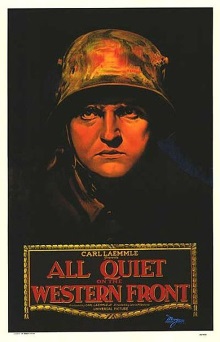
All Quiet on the Western Front was the film about the First World War that was recommended by professor Philip Zelikow of the history course I took on Coursera recently. Of course, with its wonderfully evocative title, this film is famous enough that it shouldn’t need an introduction. As Zelikow noted in his lectures, this film benefited from being made only a short time after the war and so could enlist large numbers of real veterans to act as extras and advisers, giving it a unique touch of authenticity.
It’s early days in the Great War and Germany dreams of an easy victory. Egged on by a passionate professor, an entire class of young boys sign up for the army. Following a bout of training by an abusive supervisor who is also their town’s postman, the boys are assigned to the 2nd Company. Their idealism is shattered right from the very start. They discover that there is no clear leadership and no food save what they can scavenge for themselves. A veteran survivor Katczinsky teaches them the basics of how to survive but they lose one of their number on the first night. They spend days under bombardment, not knowing when the next bomb will collapse their bunker and kill them all. When they do fight, they simply exchange the same small stretch of land back and forth over and over again with the enemy. Years later, the main character Paul Bäumer is the only one of his class still fighting and the war is still going on. After being severely wounded and recovering, he is allowed a few days’ leave at his home town. He discovers that he finds it impossible to relate to the civilians who talk about the war and yet know nothing about what it’s like. He is further disgusted that the same professor is still encouraging an even younger class of students to sign up for the war.
All Quiet on the Western Front says nothing that hasn’t been said already by every war film that emphasizes the horror and futility of war but its argument deserves extra weight because it is probably the very first film to do so. I found it surprising how familiar and modern it feels given its age. Many films of that era often look like stage plays captured on film but this one looks much like any war film of the modern era. The special effects look realistic, with explosions that drop on the soldiers from seemingly out of nowhere; the action choreography perfectly captures the confusion and chaos of a large scale battle; and powerful emotional moments that show the young soldiers’ progressive mental degradation as the days pass. It makes for an effective depiction of post trauma stress disorder long before the term was invented. It’s no wonder that when critics praised Steven Spielberg for Saving Private Ryan he commented that he had merely copied this film. Watching this, you’ll have a hard time believing that it was really made in 1930.
The film’s ending is especially powerful. The scene in which Bäumer voluntarily cuts short his leave early to rejoin his comrades is poignant. He is at first overjoyed to find his old company, then confused when all he sees are unfamiliar faces and finally depressed when he realizes what has happened to them. The performers’ acting isn’t all that good by modern standards. In particular, director Lewis Milestone resorts too often to having them declare what their characters feel rather than showing through their faces and actions. You’d also have to suspend your disbelief to buy that these are Germans given how blatantly they sound and look American. But there’s little doubt that the film achieves what it sets out to do. It also lives up to its opening statement, one taken straight from the book it was based on, that it doesn’t seek to accuse any party of wrong-doing, merely to show audiences what being in the war felt like for a soldier in the German army.
The film isn’t as politically hard hitting as it could be. If I were in Bäumer’s place, I would have punched that professor in the face if I saw him all but shaming another group of students into becoming soldiers. His companions joke about how the kings and generals should be made to fight it out themselves in a field if they ever felt like starting a war again but there’s no serious talk about deserting or refusing to fight. They don’t even protest about not being given proper gear while on duty. This didn’t prevent the film from being condemned and banned by the Nazi regime in Germany for its anti-war message. It was even banned for a while in countries like Australia, Italy and France. I guess the people in power really don’t like it if you try to tell their people how pointless it is to fight and die for them. For my part, this film reminded me once again how grateful I should be for not having to live through a period of war. This is a great war film and its age does nothing to diminish its relevance.
One thought on “All Quiet on the Western Front (1930)”